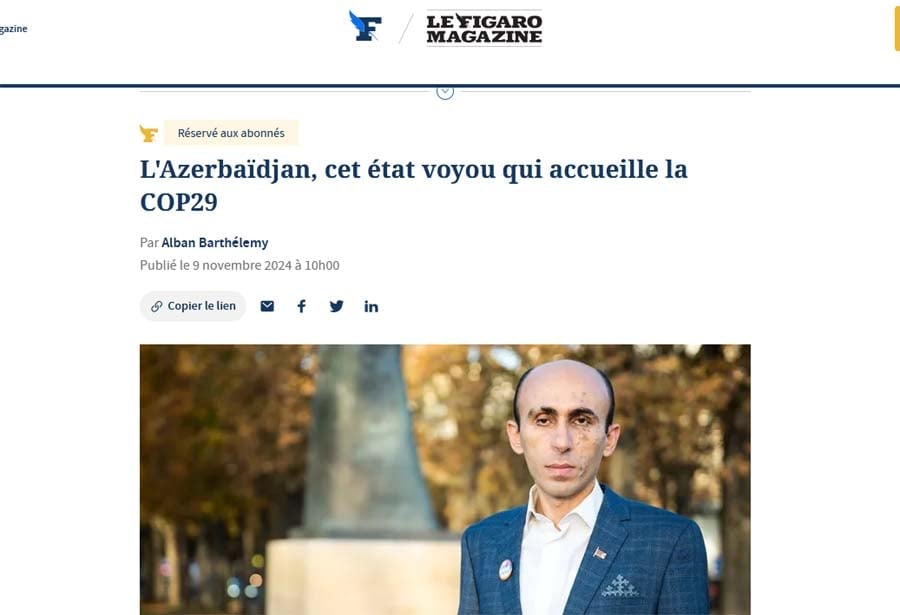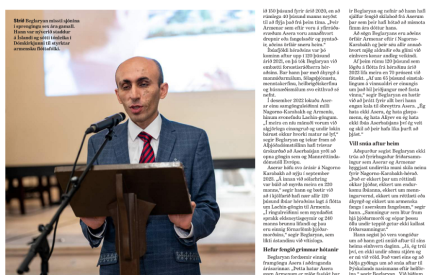Artak Beglaryan, president of the Artsakh Union, former State Minister and Human rights Ombudsman of the Republic of Artsakh, gave an interview to the leading French magazine Le Figaro, which was published in both print and electronic versions. The full article is presented below.
The new climate summit opens in mid-November in Baku. Forced out of his country along with 100,000 compatriots, former State Minister of Nagorno-Karabakh, Artak Beglaryan, calls for pressure on President Aliyev’s regime, which he accuses of genocide against Armenians.
His face bears signs of hardship, but his voice is resolute. On September 19, Artak Beglaryan filed a complaint to the International Criminal Court (ICC), along with his compatriot Gegham Stepanyan. Their hope is that an investigation will be opened into the crimes committed by Azerbaijan in Nagorno-Karabakh. “It’s genocide. Only politicians refuse to use this word. I’m certain that one day it will be recognized by the international community.”
The timing is not coincidental: on November 11, COP29, a major international climate conference, launches in Baku. And this is happening while at least 23 Armenian prisoners are officially still detained by President Aliyev’s regime. “In reality, numerous signs suggest the number of prisoners is closer to 100. For most of them, we don’t even know if they are still alive.”
Read also
Artak Beglaryan has faced many hardships. Born in 1988 in Stepanakert, the capital of Nagorno-Karabakh, he recalls poems, songs and meledies from his childhood. He was only about four years old when his father was killed at the front by Azerbaijani soldiers. Two years later, while playing with friends in their yard, a landmine explosion left him blind. At 16, his mother died of a heart attack, leaving the young boy completely alone. Despite it all, he managed to study in Yerevan, Armenia’s capital, and later at the prestigious University College London, where he was offered the chance to stay. “But I returned to Nagorno-Karabakh to serve my people. That’s my life mission, which brought me home.” He became the ombudsman—the equivalent of a human rights defender—then chief of staff to the President and later State Minister.
In December 2022, with the beginning of a blockade orchestrated by Azerbaijan, life in Nagorno-Karabakh became increasingly unbearable. Essentials ran out: oil, grains etc. “For several weeks, my wife and I didn’t eat bread so that we could give it to our two daughters.” At the beginning of 2023, electricity and gas supplies from Armenia were disrupted: “In the dead of winter, we only had power for 12 to 16 hours a day. People had no heating, and schools were temporarily closed. Even water supplies became an issue.”
On September 19, 2023, when Azerbaijani troops fully invaded Nagorno-Karabakh, he learned that soldiers were looking for him, too. He decided to flee with his family and his brother’s family. “It took us nearly 27 hours to cover the roughly 50 kilometers to the Armenian border. I didn’t even get out of the car; my relatives were afraid they would arrest or kill me.”
Today, Artak Beglaryan is a refugee with relatives in Yerevan. “I work part-time in a private organization to support my family. The rest of the time, I actively continue to advocate for my people’s rights.”
Ahead of COP29, he calls for the release of all Armenian hostages held in Azerbaijan. He also wishes for Emmanuel Macron and the French government to support his complaint at the ICC. Filed by two French lawyers, Catalina de la Sota and François Zimeray, it stands little chance of success without the support of at least one of the Rome Statute signatories recognizing the ICC’s authority. He also hopes for firm sanctions from the international community against those responsible for these crimes. “When political support is just beautiful words and empathy, it’s not real support. Dictators, and particularly perpetrators of genocides, don’t care about statements and words.”
Despite everything he has endured, the former State Minister maintains strong hope: “I have suffered greatly since childhood, but I have always managed to overcome these difficulties. If we combine our efforts, I believe that one day it will be possible to achieve peace and justice not only for my people but also for all of humanity.”























































